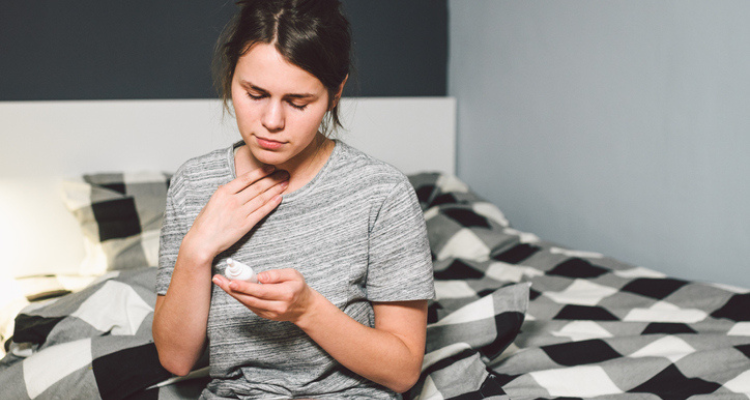
Sleep is not a place we go; It's a state we fall into.
But for some people, sleep isn’t as easy as it is for others. For most of us who struggle with sleep, it's less of a physiological issue than a habitual one. We build bad habits that affect our sleep quality. Sometimes we've been creating those habits since childhood, so they can be challenging to break.
Melatonin is best used as a short-term tool to help us reset the body's clock, making it a little easier to break our poor sleep habits.* However, most people tolerate long-term low-dose melatonin supplementation quite well.
The Importance of Melatonin
Melatonin is vital for helping us balance our daily lives for many reasons. It's one of the human body's principal sleep hormones. In short, melatonin gets our body ready for sleep.* It's not something that shuts us down and keeps us asleep. However, there is a common misconception that taking melatonin in a nutritional supplement form is similar to taking a sleeping pill. This couldn't be further from the truth.
In my experience, only about 30-percent of people who use melatonin supplements feel sleepy right away. For most of us, it takes a bit of time for the melatonin to move through our bodies and take effect and keep in mind, it's still only part of the sleep equation.*
Our body contains varying levels of melatonin throughout the day. In most cases, production tends to peak around 9 PM and reduces during the night and early morning until levels taper off before dawn. It's one of the key signals letting us know we're tired and need to sleep.*
Sleep pressures buildup throughout the day. These pressures are a combination of our circadian rhythm, melatonin, and other sleep hormones. When these pressures are well-balanced, we get tired around the same time each night, and we wake up at approximately the same time in the morning, almost like we're programmed. But our sleep pressures can change depending on our age, stress levels, and the various things happening in our lives.
When external factors affect our sleep, melatonin levels can drop out of sync with where they should be during the day, resulting in trouble getting quality sleep. An excellent example of this is jet lag, which affects our bodies when we travel long distances. Travel, or even a sudden change in our work shift work, can destroy our sleep schedules. This is because our melatonin levels get thrown out of sync with the sun's rise and fall, and our circadian rhythm is off.
Melatonin supplementation can improve the timing of peak melatonin levels and get our circadian rhythm back on track.* It's something that we can use along with better sleep habits to help reset our internal clock.

Aspects of Basic Sleep Hygiene:
- A quiet, dark environment
- Relinquishing the day for a calmer state of mind
- Dimmer lights as we prepare for sleep and no blue-light from electronic screens for at least an hour before bedtime
- Less late-day stimulants such as caffeine
- Not eating directly before bedtime
- Making sure you get enough exposure to natural light during daytime hours
Liposomal Technology for Melatonin
Liposomal technology is fantastic because it completely changes the carrier state of the nutritional supplements in your body, whether it’s something water-soluble like vitamin C, or fat and water-soluble like melatonin. In a nutshell, it encapsulates the hormonal chemical in a lipid bilayer for a more efficient delivery than standard solid forms.
Instead of placing the melatonin in a capsule, ingredients are packed inside round lipid vesicles that mimic the body's cell membranes. With liposomal delivery, the body doesn't need to digest and metabolize the ingredients for delivery to the system. Instead, it interacts directly with the gut mucosa and cell membranes in the GI tract for improved absorption.
Is Liposomal Melatonin Better?
The body quickly absorbs melatonin in pretty much any form, so the speed of absorption isn't an issue. Efficacy is more of a concern.
According to Research Gate, oral melatonin tablets have an absolute bioavailability of about 15 percent. So, if you take a 4mg melatonin pill, your body is probably only absorbing and utilizing around 0.6mg. The liposomal encapsulation of ingredients ensures a much-improved bioavailability.
Whether or not liposomal melatonin is better than pills or gummies depends on the individual's unique physiological needs. For example, if someone has difficulty swallowing pills, a liposomal spray would be ideal. Difficulty swallowing is usually the case for children, so liquid melatonin and sprays tend to work better for them.
A person with an irritable digestive tract, general gastrointestinal dysfunction, or who has had gastric bypass might be better off by limiting artificial carrier systems such as synthetic capsules. But a person who has no problems with GI irritability, absorption, or swallowing pills may find the difference between a tablet, capsule, or liposomes as marginal.
Adequate melatonin levels are essential for healthy living.* It helps regulate our sleep patterns, but melatonin is also a potent free-radical fighter and detoxifier – so, our body uses it for multiple purposes.* If protection from the stomach's degradative environment is needed (for optimal bioavailability) or if a more convenient and flexible delivery system is necessary, then liposomal melatonin may be the best answer. Consulting your functional medicine practitioner to understand what form of melatonin will work best for you is the best first step.

*These statements have not been evaluated by the Food and Drug Administration. This product is not intended to diagnose, treat, cure, or prevent any disease.


















